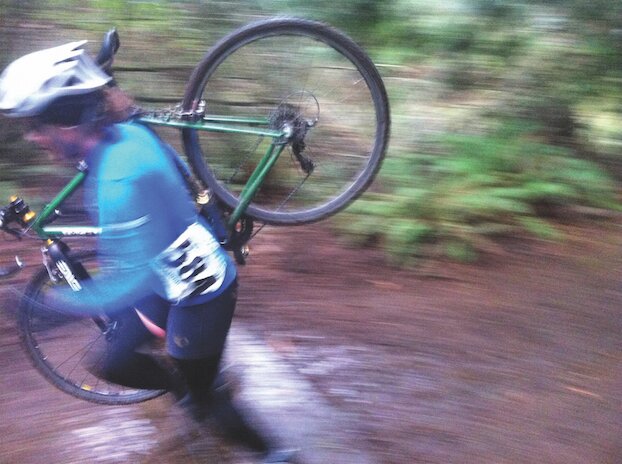
The wind at Cornwall Park in Bellingham was coming at them hard on the last race of the season. It tugged on the white tape that guided the cyclists through the course. It blew them off balance. It pushed rain, mud and leaves into their faces.
“It’s getting nicer out,” one of them said as a blast of wind and pine needles dumped down from the sky.
On the surface, the gritty, mud-streaked cyclocross (CX) racers seem a far cry from the generally easygoing nature of the Whatcom County cycling community. But they will tell you they are no different.
A community sport
Ryan Rickerts, the founder of Bellingham’s cyclocross series, Cascade Cross, believes the true nature of the sport is not about the competition. From setting up the trails to racing alongside friends, cyclocross is about being a member of a
community.
“We’re all here to have fun,” Rickerts said. “If you go to a race with a thousand people and you don’t know anybody and everyone’s nervous, you don’t get the same vibe.”
The cyclocross season in Whatcom County lasts from October to January and draws crowds from the road and mountain biking community who want to stay active in the off-season.
“It lifts your spirit in a dark time of the year,” Rickerts said.
Rickerts became the de facto leader of the cyclocross community in Whatcom County after inheriting a following in 2006 from the previous cyclocross series, Belly Cross.
In the beginning, Cascade Cross was a three-race series. This year’s series took racers throughout Whatcom and Skagit counties to Bellingham, Ferndale, Maple Falls and Sedro-Woolley.
The series has since expanded to eight races, drawing in cyclists from Washington, Oregon and British Columbia. The sport is growing, not just in the Northwest, but across North America. Cyclocross is often referred to as the fastest growing discipline in competitive cycling, according to USA Cycling, the governing body for professional U.S. cyclists.
The sport got its start in Europe and is most popular in Belgium, France and the Netherlands. One of the attractions of cyclocross in the Northwest is the sense of camaraderie.
“I try to make it legitimate, quality cyclocross, but with a small town atmosphere,” Rickerts said. “For me it’s about seeing people get outside, bonding over sports. I’d rather see people out here cheering their friends than in front of the TV cheering some team in Seattle.”
Getting dirty
Don’t mistake the cyclists’ neighborly demeanor for weakness. Cyclocross can be intense.
“It’s all out. Forty-five minutes to an hour,” Rickerts said. “You really get inside your head. You’re kind of racing yourself.”
Cyclocross is a blend of different styles of cycling that can be a challenge to both road bikers and mountain bikers.
Racers compete by racing through the course multiple times through varied terrain and a series of obstacles, some of which require them to “shoulder” their bike and carry it on foot. Wooden ramps, dirt berms and water-filled pits are common. Cyclists are scored by their overall time. The races are divided by gender and experience.
Cyclocross bikes are typically mash-ups of different types of bicycles. A road bike frame with thick tires, mountain bike pedals and brakes is a common variation.
Mountain bikes work for cyclocross, but can slow the rider down. Road bikes might provide better speed, but don’t always provide the best traction. Selecting the perfect bike can be an artful balancing act, but many riders just use whatever is on hand.
“You can race on whatever,” said Ian Schmitt, a product manager at Kona bikes out of Ferndale, and a competitor in the Cascade Cross series. “You can race on a commuter bike or you can race on a clunker.”
Schmitt sports a black Kona with a CX-specific “Super Jake” frame. Another Ferndale bike company, Transition, released their CX-specific “Rapture” in 2013. Prices for stock-fitted, competition-ready cyclocross bikes run the gamut from $1,000 to $6,000.
The courses are usually only a couple of kilometers long, making the sport more spectator-friendly than longer road-racing courses. Obstacles thrown in for cyclists to navigate, such as stairs, bridges and cones, make for an exciting spectacle. What makes the Northwest – and Whatcom County in particular – unique is the density of “things” on the ground, Schmitt said, such as trees, ferns and the occasional stump.
At places like Cornwall Park in Bellingham, where Cascade Cross hosted the final race of the season, the natural geography and walking trails provide some of these obstacles already. The race left its mark on the park in muddy tracks through the grass.
“The spirit of cyclocross is probably something you won’t understand until you come out and experience it,” Rickerts said.
As the race finishes at Cornwall Park, cyclists take their helmets off and guide young children on training wheels throughout the mud. Others linger off the track, holding either a beer or a dog leash. It’s moments like these that keep Rickerts at it.
“You can see the smiles on everyone’s faces,” he said. “It’s kind of infectious.”
The cyclocross season might be over, but there’s no time like the present to start training for next fall. Practice for the Cascade Cross series will begin at the Cascade Cross course at 5022 Guide Meridian in Bellingham in July. The park is shared with Bellingham BMX. Rickerts plans to host the first cyclocross race in the first week of October. x